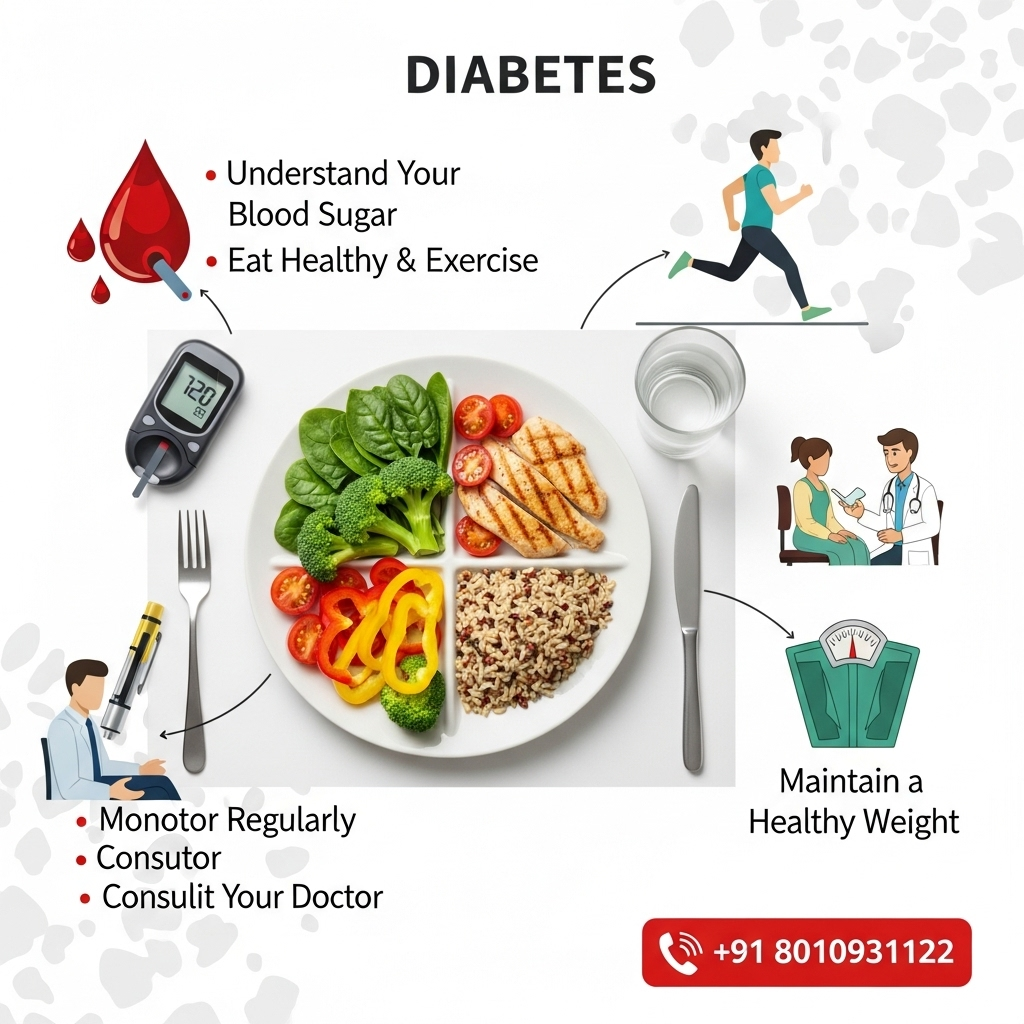How to Effectively Control Blood Sugar Levels: A Complete Guide
Control Blood Sugar Levels-Maintaining stable blood sugar levels is essential for everyone, but it is especially important for individuals with diabetes or those at risk of developing it. Whether you are managing type 1 or type 2 diabetes, or simply want to prevent blood sugar levels from rising, understanding how to effectively control your blood sugar can improve your overall health and well-being.
Adopt a Healthy, Balanced Diet
A well-balanced diet plays a central role in controlling blood sugar levels. What you eat directly affects how much glucose enters your bloodstream. Focus on nutrient-dense foods that provide steady energy without causing sharp spikes or dips in blood sugar.
Key dietary principles:
- Choose complex carbs: Whole grains, legumes, and vegetables are rich in fiber and are digested slowly, helping to keep blood sugar levels stable. Avoid refined carbs like white bread, sugary snacks, and pastries.
- Eat lean proteins and healthy fats: Incorporate protein-rich foods (chicken, turkey, fish, tofu) and healthy fats (avocados, nuts, olive oil) into your meals to slow the absorption of sugar and support overall health.
- Prioritize fiber: Fiber-rich foods like vegetables, fruits, whole grains, and legumes help regulate blood sugar by slowing digestion and absorption.
Tip: Aim to fill half your plate with vegetables, one-quarter with lean protein, and one-quarter with whole grains at each meal for balanced blood sugar control.
Portion Control is Key
Overeating—even healthy foods—can lead to blood sugar spikes. Keeping portion sizes in check is essential to maintaining stable blood sugar. Try using smaller plates, measuring your food, or practicing mindful eating to avoid overeating.
Tip: Using the “plate method” is a simple way to control portions. Fill half your plate with non-starchy vegetables, a quarter with lean protein, and a quarter with whole grains or starchy vegetables.
Exercise Regularly
Physical activity is one of the most effective ways to lower and maintain healthy blood sugar levels. Exercise helps your body use insulin more efficiently and burns glucose for energy, which can lower blood sugar levels both during and after activity.
Recommended activities:
- Aerobic exercises: Walking, jogging, swimming, or cycling help improve insulin sensitivity.
- Strength training: Lifting weights or doing resistance exercises helps build muscle, which also improves insulin function.
- Stretching or yoga: These can help reduce stress, which in turn helps regulate blood sugar levels.
Tip: Aim for at least 30 minutes of moderate exercise most days of the week. Try to include a mix of cardio and strength exercises for the best results.
Monitor Your Blood Sugar Levels
Regular blood sugar monitoring gives you insight into how your lifestyle choices affect your glucose levels. By checking your blood sugar before and after meals, exercise, and medications, you can identify patterns and make adjustments as needed.
Tip: Talk to your healthcare provider about the best times to check your blood sugar and what target range is right for you. Keeping a log of your readings can help you spot trends and stay on top of your control efforts.
Stay Hydrated
Dehydration can cause blood sugar to rise, so staying hydrated is essential for effective blood sugar control. Drinking plenty of water helps your kidneys flush out excess sugar through urine.
Tip: Aim to drink at least 8 cups (64 ounces) of water per day. You can increase this amount if you’re physically active or live in a hot climate.
Get Enough Quality Sleep
Lack of sleep or poor-quality sleep can negatively affect your body’s ability to regulate blood sugar and insulin levels. Studies show that people who don’t get enough sleep may experience higher blood sugar levels and an increased risk of insulin resistance.
Tip: Aim for 7-9 hours of restful sleep each night. Create a relaxing bedtime routine and avoid using electronic devices before bed to improve your sleep quality.
Manage Stress Levels
Chronic stress can lead to increased levels of cortisol, a hormone that can raise blood sugar. Learning how to manage stress effectively is an important part of blood sugar control.
Effective stress management techniques:
- Deep breathing exercises
- Mindfulness and meditation
- Yoga or tai chi
- Spending time in nature or with loved ones
Tip: Take time each day to engage in stress-reducing activities. Even just 10-15 minutes of relaxation can help reduce the impact of stress on your blood sugar.
Follow Your Doctor’s Advice and Medication Plan
For individuals with diabetes, taking prescribed medications as directed by your healthcare provider is essential. Medications like insulin, metformin, or other blood sugar-lowering drugs can help keep your glucose levels within a healthy range.
Tip: If you’re taking medication for diabetes, make sure you follow your doctor’s instructions and attend regular check-ups to monitor your progress. Never skip doses without consulting your healthcare provider.
Avoid Smoking and Excessive Alcohol
Smoking and excessive alcohol consumption can contribute to high blood sugar levels and increase the risk of complications associated with diabetes. If you smoke, consider seeking support to quit. Drink alcohol in moderation, as it can interfere with blood sugar control and interact with certain medications.
Tip: Limit alcohol intake to one drink per day for women and two drinks per day for men, and avoid sugary mixers or high-carb cocktails.
Stay Consistent
Consistency is key to managing blood sugar effectively. Small, healthy choices made consistently over time can have a big impact on your blood sugar levels. Stay committed to your healthy habits and work closely with your healthcare provider to adjust your plan as needed.
Tip: Track your meals, exercise, medications, and blood sugar levels in a journal or app. This will help you stay accountable and identify what works best for you.
Final Thoughts: Your Path to Better Blood Sugar Control
Controlling blood sugar effectively is a lifelong journey that requires consistency, commitment, and regular monitoring. By adopting a balanced diet, staying active, managing stress, and working closely with your healthcare team, you can keep your blood sugar levels under control and prevent long-term complications.
Remember that every individual is different, so what works for one person may not work for another. It’s important to find the strategies that work best for your body and make gradual adjustments as needed.
Take responsibility for your health and don’t hesitate to contact your healthcare provider for personalized advice and support. With the right plan, you can live a healthy, active life while keeping your blood sugar levels under control.











Leave a Reply